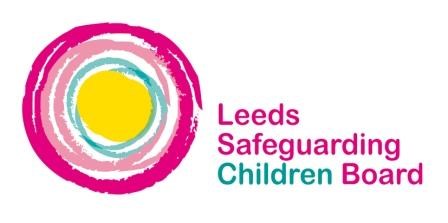
22 Sep 2017
Leeds safeguarding conference focuses on child neglect
Practitioners who work with children, young people and families across the city are coming together next week to discuss the important issue of child neglect.
The Leeds Safeguarding Children Board (LSCB) has organised their sixth annual conference with support from partner agencies, including Leeds City Council, the NHS and the Third Sector.
The conference is being hosted by Dr Mark Peel, the Independent Chair of the LSCB, and takes place on Tuesday 26 September at Cloth Hall Court.
Child neglect is a concern both regionally and nationally and next week’s conference will help practitioners who work with children and families across the city, explore this and understand how Leeds as a city is working to raise awareness and trying to prevent all types of neglect – from antenatal to adolescence.
The conference aims to help delegates understand more about the issues and challenges of neglect, and identify ways in which practitioners can recognise neglect, and what support they can offer children, parents and carers.
Dr Mark Peel, Independent Chair of the Leeds Safeguarding Children Board said:
“It is so important that those people who work with children, young people and families across Leeds understand the issues around child neglect, are able to identify it and know what they can do to help prevent it, and support those children who are affected.
“We want to help practitioners ensure they are well equipped to help those who are at risk and offer the support and guidance they need. This conference brings together experts from across the health, social care and legal professions and offers practical and useful advice, which delegates can take away and put into practice in their own roles.”
Delegates will hear from a series of distinguished key note speakers including:
Professor Nina Biehal who works at the Department of Social Policy and Social Work at the University of York and was formerly a social worker in Leeds. She has conducted many studies of children who are looked after, on the edge of care or returning home from care.
Sumi Cannon who is a Psychoanalytic Child and Adolescent Psychotherapist at the Northern School of Child and Adolescent Psychotherapy in Leeds, and previously worked in CAMHS for 17 years. She is the course leader of the 10-week intensive Infant Mental Health course and a course tutor on the Masters in Psychoanalytic Observational Studies programme and teacher of Infant Observation.
Susan Fricker who began her career as a Barrister in 1988 dealing with Criminal, Civil and Family cases. After a career break to raise her 4 children she returned to practice in 2010 and since then has worked mainly in care proceedings where she represents local authorities, parents, family members and Children's Guardians.
Laura Liddell who is a Psychoanalytic Child and Adolescent Psychotherapist and works at the Northern School of Child and Adolescent Psychotherapy (NSCAP) in Leeds. She has worked with children who have experienced early neglect, trauma and loss and is currently involved in the development and delivery of specialist clinical services in a number of educational settings.
Delegates will be able to choose from a selection of workshops on the day, which include:
- Holistic Family Assessment in identifying and responding to neglect
- What can workers do to help young people experiencing neglect
- Adolescent neglect
- Neglect in health
- Parental substance use and neglect
Notes:
Neglect is:
The persistent failure to meet a child’s basic physical and / or psychological needs which likely to result in the serious impairment of the child’s health or development. Neglect can start to occur during pregnancy and once a child is born, neglect may involve a parent or carer failing to: provide adequate food, clothing and shelter; protect a child from physical and emotional harm or danger; ensure adequate supervision; or ensure access to appropriate medical care or treatment. It may also include neglect of, or unresponsiveness to, a child’s basic emotional needs.
There are six classifications of neglect which are:
- Medical
- Nutritional
- Emotional
- Educational
- Physical
- Lack of supervision and guidance
ENDS
For media enquiries contact:
Leeds City Council Communications team
communicationsteam@leeds.gov.uk